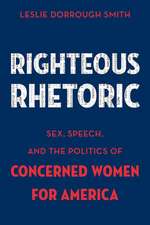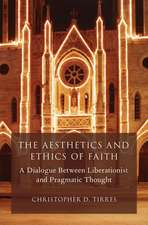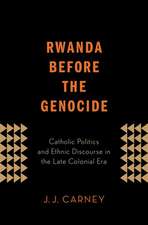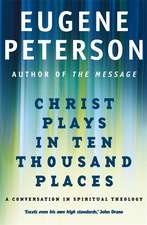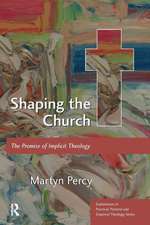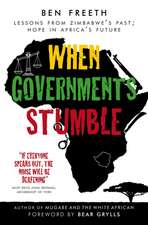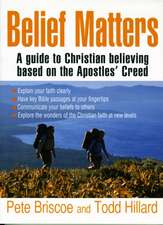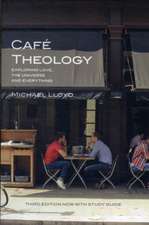Politics in Friendship: A Theological Account
Autor Dr Guido de Graaffen Limba Engleză Hardback – 24 sep 2014
| Toate formatele și edițiile | Preț | Express |
|---|---|---|
| Paperback (1) | 257.03 lei 6-8 săpt. | |
| Bloomsbury Publishing – 23 mar 2016 | 257.03 lei 6-8 săpt. | |
| Hardback (1) | 715.19 lei 6-8 săpt. | |
| Bloomsbury Publishing – 24 sep 2014 | 715.19 lei 6-8 săpt. |
Preț: 715.19 lei
Preț vechi: 1028.03 lei
-30% Nou
Puncte Express: 1073
Preț estimativ în valută:
136.91€ • 140.88$ • 115.41£
136.91€ • 140.88$ • 115.41£
Carte tipărită la comandă
Livrare economică 01-15 martie
Preluare comenzi: 021 569.72.76
Specificații
ISBN-13: 9780567029362
ISBN-10: 0567029360
Pagini: 240
Dimensiuni: 156 x 234 x 14 mm
Greutate: 0.51 kg
Ediția:New.
Editura: Bloomsbury Publishing
Colecția T&T Clark
Locul publicării:London, United Kingdom
ISBN-10: 0567029360
Pagini: 240
Dimensiuni: 156 x 234 x 14 mm
Greutate: 0.51 kg
Ediția:New.
Editura: Bloomsbury Publishing
Colecția T&T Clark
Locul publicării:London, United Kingdom
Caracteristici
Helps readers in connecting concepts of Christian political thought to personal experience
Notă biografică
Guido de Graaff is Tutor for Christian Doctrine and Ethics, and Director of Studies, at the Southeast Institute for Theological Education (SEITE), London, UK. He is Secretary of the Society for the Study of Christian Ethics (UK).
Cuprins
AcknowledgementsIntroductionChapter 1. Friendship and Politics: Initial ExplorationsI DescriptionsII Choosing a PerspectiveIII Friends in Earthly CitiesChapter 2. A Story of Friendship: Bell and BonhoefferI Ways towards FriendshipII The StoryIII The FriendshipChapter 3. Common ActionI Aristotle: Friendship in the CityII Arendt: Politics as Acting TogetherIII Bell and Bonhoeffer: Acting Politically?Chapter 4. Common JudgementI Responding to EvilII Judgement as Political ActIII Judging TogetherChapter 5. Friends Judging in Times of Crisis4I In the Company of JudgementII Judgement in Repentance and ForgivenessIII Spectatorship or ObedienceChapter 6. Ecclesial JudgementI Jesus' Gift of Friendship (John 15)II Mutual Submission in Service (Romans 12)III Judgement Received in FriendshipChapter 7. Friends in the Church and Political SocietyI Friendship within the Body of ChristII Friendship and Political ResponsibilityIII ConclusionAppendix 1: Excerpt from Bell's DiaryAppendix 2: Die Stuttgarter Schulderklärung / The Stuttgart Declaration of GuiltAppendix 3: 'Der Freund' / 'The Friend'BibliographyIndex
Recenzii
De Graaff's book is lucid, clearly argued and a valuable contribution to a theology of friendship, and to moral theology more generally.
This book is highly recommended for those who wish to further understand the important place of friendship within the polis and the ecclesia. It also serves as an important expository document for the relation of Bell and Bonhoeffer for those interested in research on either of these two important twentieth century figures.
Friendship has sat uncomfortably on the edge of moral and political thought in the modern West, never quite accommodated to the ways in which we discuss either individual or political life. In his exploration of the political resources of friendship De Graaff, like Cicero in antiquity, takes an historical pair of friends to think about, and by interrogating the example of Bell and Bonhoeffer, opens our eyes to important and exciting currents in friendship that have suffered from persistent neglect.
There is renewed and welcomed interest in friendship as a crucial constitutive part of the moral life. Guido de Graaff draws on much of that literature but with a creativity that is truly remarkable. In particular, how he understands the relationship between friendship and politics and displays how that transforms "the political" is an exemplification of the kind of work we so desperately need in Christian theology. Moreover, by concentrating on the relation between Bonhoeffer and Bishop Bell we are able to see how friendship is at least one way in which friendship can create a community that can limit the political.
This book presents a fresh, narratival approach to contemporary political theology. Recent work in political theory and philosophy has revived interest in classical themes of civic friendship and the common good. Friendship in Politics engages these discussions with conceptual rigor and insight, drawing from biblical and theological sources in ways that affirm and challenge these developments. Such scope, nevertheless, risks abstraction. By focusing on the concrete practices of friendship embodied by George Bell and Dietrich Bonhoeffer during the political crises of the 1930's and 1940's, the author resists this temptation and introduces a novel account of discipleship and citizenship in the modern world. It is difficult to think of a comparable work on friendship and politics.
Through the story of Bishop George Bell and Dietrich Bonhoeffer's friendship amid 'dark times' De Graaff develops a theologically rich, analytically sophisticated and compelling account of the relationship between friendship and political judgment. It is an account which is attuned to the disjunctures and connections between classical, Christian and contemporary political thought and the relational basis on which Christians are called to exercise faithful witness.
This book is highly recommended for those who wish to further understand the important place of friendship within the polis and the ecclesia. It also serves as an important expository document for the relation of Bell and Bonhoeffer for those interested in research on either of these two important twentieth century figures.
Friendship has sat uncomfortably on the edge of moral and political thought in the modern West, never quite accommodated to the ways in which we discuss either individual or political life. In his exploration of the political resources of friendship De Graaff, like Cicero in antiquity, takes an historical pair of friends to think about, and by interrogating the example of Bell and Bonhoeffer, opens our eyes to important and exciting currents in friendship that have suffered from persistent neglect.
There is renewed and welcomed interest in friendship as a crucial constitutive part of the moral life. Guido de Graaff draws on much of that literature but with a creativity that is truly remarkable. In particular, how he understands the relationship between friendship and politics and displays how that transforms "the political" is an exemplification of the kind of work we so desperately need in Christian theology. Moreover, by concentrating on the relation between Bonhoeffer and Bishop Bell we are able to see how friendship is at least one way in which friendship can create a community that can limit the political.
This book presents a fresh, narratival approach to contemporary political theology. Recent work in political theory and philosophy has revived interest in classical themes of civic friendship and the common good. Friendship in Politics engages these discussions with conceptual rigor and insight, drawing from biblical and theological sources in ways that affirm and challenge these developments. Such scope, nevertheless, risks abstraction. By focusing on the concrete practices of friendship embodied by George Bell and Dietrich Bonhoeffer during the political crises of the 1930's and 1940's, the author resists this temptation and introduces a novel account of discipleship and citizenship in the modern world. It is difficult to think of a comparable work on friendship and politics.
Through the story of Bishop George Bell and Dietrich Bonhoeffer's friendship amid 'dark times' De Graaff develops a theologically rich, analytically sophisticated and compelling account of the relationship between friendship and political judgment. It is an account which is attuned to the disjunctures and connections between classical, Christian and contemporary political thought and the relational basis on which Christians are called to exercise faithful witness.







